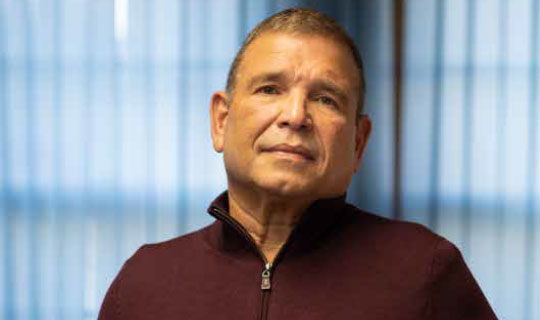“All my numbers are perfect. Some of my doctors are amazed.”

Bariatric Surgery Reverses Serious Health Disorders for a Local Man.
At a compact 5'7" and 227 pounds, Julio Sabater wasn’t an obvious candidate for weight loss surgery. “To look at me, you wouldn’t have thought I was obese,” says the 62-year-old founder, president and chief executive officer of a workforce development service in Elizabeth.
When Julio met with Anish Nihalani, MD, Medical Director at the Surgical Weight Loss Program at Robert Wood Johnson University Hospital (RWJUH) Rahway, in December 2018, “Dr. Nihalani looked at me and said, ‘Why are you here?’” Julio recalls. “When I told him, he said, ‘Those are good reasons.’”
Though Julio had been overweight for most of his life, his health took a turn for the worse in his mid-50s. He was diagnosed with diabetes, which occurs when the body has difficulty using the hormone insulin. It was part of a constellation of serious metabolism-related disorders that include heart disease and are known collectively as metabolic syndrome. “This was a wakeup call,” Julio says. “Losing weight became urgent.”
Lap Band Limits
In 2010, he decided to undergo a procedure called laparoscopic adjustable gastric banding, or lap band. The minimally invasive procedure places an inflatable ring across the upper part of the stomach to create a smaller pouch to hold food, leading to a feeling of fullness more quickly.
“I lost 15 or 20 pounds after surgery,” Julio says. But he continued to struggle to control his weight despite doing aerobic exercise, going to the gym and watching his diet. His diabetes remained, and he had high blood pressure, back pain, numbness in his left leg and obstructive sleep apnea, a condition in which fleshy tissue in the throat blocks breathing during slumber.
“I was still messed up and taking about 15 pills a day,” Julio says. Eventually, he had a minor heart attack that led him to receive four stents to keep clogged arteries open.
“I needed to do something further that would have a bigger impact,” Julio decided. That’s when he went to see Dr. Nihalani.
“Laparoscopic banding can be a great operation, but it’s purely restrictive and causes no metabolic changes,” Dr. Nihalani says. “As with many obese people, Julio needed to correct his metabolism as much as his weight.”
Metabolic Benefits
Dr. Nihalani and Julio decided to take a different approach with a procedure called laparoscopic sleeve gastrectomy, also known as gastric sleeve surgery. While minimally invasive, the surgery permanently reduces the size of the stomach by about 70 percent. The process also changes signaling of hormones such as ghrelin, which tells the brain you’re hungry, and GLP-1, which tells the brain you’re full.
“All bariatric surgeries cause you to lose weight, but data show that metabolic surgery allows control of problems related to metabolic syndrome, including diabetes and heart disease,” Dr. Nihalani says. “You don’t have to be extremely heavy to have these metabolic conditions or benefit from metabolic surgery.
“Metabolic surgery is not the last resort,” he continues. It should be one of the first options in treatment of any patient suffering from obesity and diabetes.” For those wishing to learn more, Dr. Nihalani offers individualized counseling either online or in person.
No More Pills
Julio went through three sessions of monthly preparatory education about how the surgery would affect his eating and require a healthy lifestyle. “I had been engaged with weight loss all my life and already felt well informed, but it had been difficult to succeed,” he says.
That changed dramatically after he underwent his gastric sleeve surgery in April 2019. “I lost another 40 to 50 pounds,” Julio says. “Guess how many pills I’m taking now: none.”
His diabetes is now under control, and his blood pressure and cholesterol have dropped to healthy levels. “All my numbers are perfect,” Julio says. “Some of my doctors are amazed.” He sleeps better and feels more motivated to be active. “I have a lot more energy, and even my testosterone went up,” he says.
Results have been so life-changing that Julio has become a proponent of bariatric surgery among friends, relatives and even strangers.
“People say they’re afraid of surgery,” he continues. “But not taking action is not avoiding risk. On the contrary, it means you have a very high risk of premature death, or being old and in really bad shape. That sounds strong, but regretfully, it’s true. Not making a decision is in fact a decision.”
Julio now wishes he’d had gastric sleeve surgery sooner. “There’s a whole improvement cycle you move into where you lose weight, which gives you energy, which gives you more motivation, which makes you more active, which makes you lose more weight,” he says. “It’s the opposite of what happens when you’re obese. It’s been incredible.”
Welcome back! RWJUH Rahway has taken every precaution to make health care safe for our patients, employees and visitors. To learn more about weight loss surgery at RWJUH Rahway, call 732.499.6300 or visit www.rwjbh.org/weightloss.